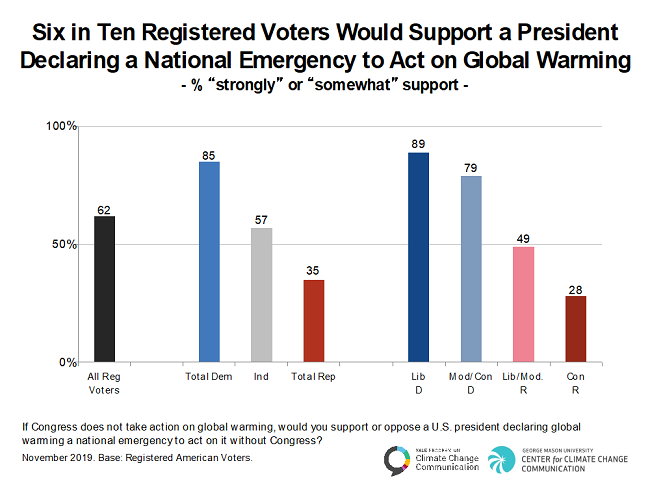As the 2020 presidential election in the United States draws closer, indications are that the climate change phenomenon will play a major part in deciding the winner. President Donald Trump, an avowed climate denier, is seeking a second four-year term in office.

According to a report released on Tuesday, January 21, 2020 by the Centre for Climate Change Communication of the George Mason University in Fairfax, Virginia, global warming – a long-term rise in the average temperature of the Earth’s climate system and a major aspect of climate change – is fast emerging as a voting issue.
Titled “Politics & Global Warming”, the national survey revealed that over four in 10 registered voters (45%) say a candidate’s position on global warming will be very important when they decide who they will vote for in the 2020 presidential election.
This is said to represent an increase of 7 percentage points since April 2019. This includes 72% of Democrats (+8 points), 41% of Independents (+7 points), and 13% of Republicans (+1 point).
According to the report, of 29 issues asked about, global warming is the 11th most important voting issue for registered voters, up six ranks since April 2019. Among liberal Democrats, it is the third most important voting issue, and it is the seventh most important issue for moderate/conservative Democrats.
When registered voters were then asked to choose their single most important issue when voting for a candidate, however, global warming is ranked number five overall.
Among liberal Democrats global warming is number one, and among moderate/conservative Democrats it is number five.
However, global warming is not a top 10 issue among Republicans.

Majorities of registered voters support policies to reduce carbon pollution and promote clean energy.
These include:
- A Revenue-Neutral Carbon Tax, which was described as “Requiring fossil fuel companies to pay a carbon tax and using the money to reduce other taxes (such as income tax) by an equal amount,” was supported by 69% of registered voters, including 87% of Democrats, 58% of Independents, and 48% of Republicans.
- Fee and Dividend, which was described as “Requiring fossil fuel companies to pay a fee on carbon pollution, and distributing the money collected to all U.S. citizens, in equal amounts, through monthly dividend checks,” was supported by 59% of registered voters, including 77% of Democrats, 51% of Independents, and 40% of Republicans.
Large majorities of registered voters also support:
- Funding more research into renewable energy sources: 87% of registered voters, 96% of Democrats, 81% of Independents, and 77% of Republicans.
- Generating renewable energy on public land in the U.S.: 86% of registered voters, 94% of Democrats, 79% of Independents, and 79% of Republicans.
- Providing tax rebates to people who purchase energy-efficient vehicles or solar panels: 82% of registered voters, 95% of Democrats, 68% of Independents, and 70% of Republicans.
- Regulating carbon dioxide as a pollutant: 75% of registered voters, 92% of Democrats, 62% of Independents, and 59% of Republicans.

Finally, more than half of registered voters (62%) would support a U.S. president declaring global warming a national emergency, including a majority of Democrats (85%) and Independents (57%), and about one-third of Republicans (35%). Support among all registered voters increased by 17 percentage points since April 2019.
